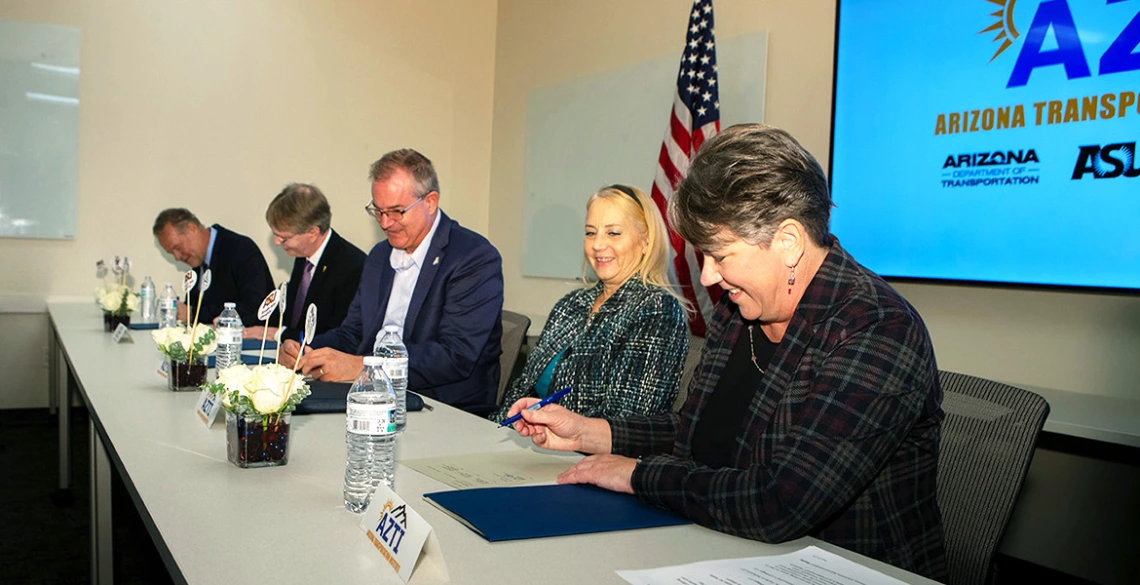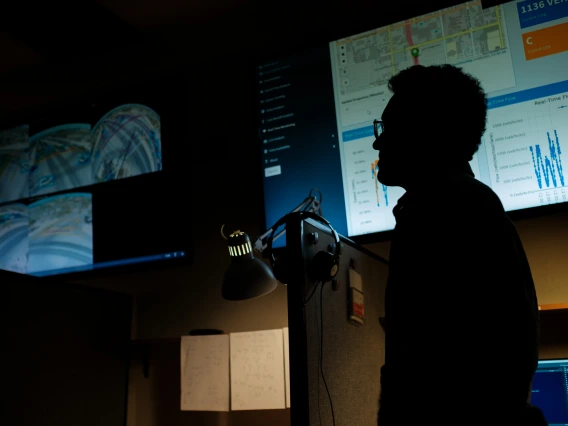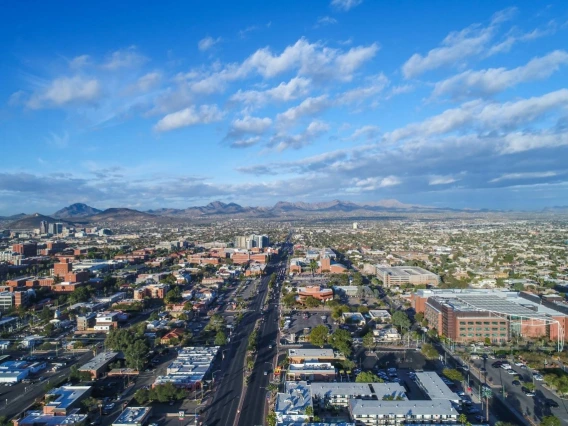ADOT launches tri-university Arizona Transportation Institute
Engineers are collaborating to improve state transportation with up to $11.5 million for high-priority research coordinated at the U of A.

Engineering deans (left to right) Charles Chadwell of NAU; Kyle Squires of ASU; David W. Hahn of the U of A; Karla Petty, FHWA Division Administrator for Arizona; and Jennifer Toth, ADOT director, sign a
letter of understanding for AZTI.
In a first for the state, the Arizona Department of Transportation is investing in a tri-university consortium to undertake research vital to safety, sustainability and the economy. Coordinated in Engineering at the University of Arizona, the institute capitalizes on strengths of the state’s three public universities.
ADOT provided $6.5 million this fiscal year for the Arizona Transportation Institute. Over the following two years, ADOT will continue funding at up to $11.5 million in total, pending approval by the the Federal Highway Administration.
AZTI, modeled after successful transportation centers in several other states, provides a structure for collaborative teams to propose and implement projects most beneficial for Arizonans, positions universities to receive additional federal research dollars, improves transportation engineering outreach and education, and boosts workforce development.
The Arizona Board of Regents approved the institute in September. An ADOT-hosted ceremony on Nov. 22 in Phoenix celebrated the partnership and featured the signing of a letter of understanding.
"We're tremendously excited to partner with talented faculty and students in a way that can improve the lives of Arizonans, support our state's economy and promote transportation engineering as an exciting and essential career," said ADOT Director Jennifer Toth.
Eight AZTI projects have already begun. They range from improving asphalt mixes to determining whether use of native plant landscaping following wildfires can reduce repair and maintenance costs for roadways. Safety is paramount among the institute's priorities. Because the national information that ADOT uses to prevent crashes is not calibrated to Arizona data or roadway conditions, researchers from the U of A and Northern Arizona University are developing state-specific recommendations for identifying the best types of safety measures, such as median barriers and traffic control lights, and optimal locations for them.
Gearing science to economic growth
Transportation affects every resident's quality of life and the success of Arizona's top industries, including mining, agriculture, renewable energy and tourism, said David W. Hahn, the Craig M. Berge Dean of the U of A College of Engineering.
"This collaborative approach is certain to drive economic growth and scientific progress," he said. "I'm grateful to ADOT for investing in the future of Arizona and empowering university engineers and students to combine ideas and efforts."
Yao-Jan Wu, AZTI executive director and U of A professor of civil and architectural engineering and mechanics, said the institute will streamline proposal and funding processes so research teams can leverage strengths across the state.
The institute's projects are expected to lead to additional grants from the U.S. Department of Transportation, he said, as federal awards require strong collaboration and the kinds of findings AZTI will generate.
Furthermore, experts are in demand to fill gaps in a field with “a severe and growing workforce shortage,” according to a report from the University of Minnesota Center for Transportation Studies. State and federal projects give
universities a platform to involve and educate students.
"The more money we bring to the state, the more we can develop the workforce. We can fund students to engage in the research and get them excited about transportation engineering," said Wu, who also is incorporating outreach programs to attract diverse workers to the field.
AZTI-associated faculty members from the U of A, Arizona State University and NAU are exploring ways to integrate transportation content into existing programs, such as the U of A College of Engineering's Summer Engineering Academy for high school students. Additionally, Wu is working to involve professional organizations such as the American Council of Engineering Companies and the Institute of Transportation Engineers, which has a student chapter at the U of A.
AZTI's planning and research committees will accept the next round of proposals in February 2025 to set additional projects in motion. As AZTI matures, Wu plans to implement a tech transfer initiative whereby institute members and staff work with engineering firms to ensure the research is applied as intended in the transportation industry.



